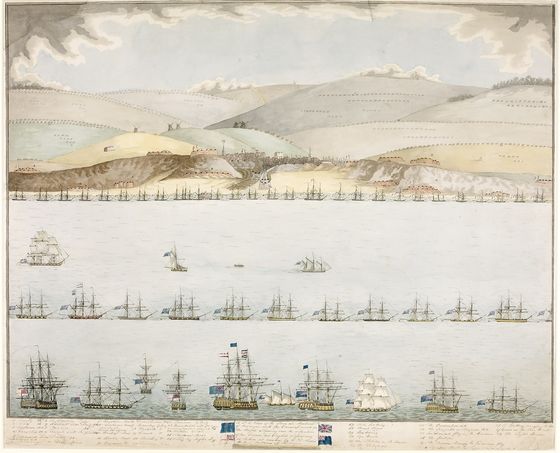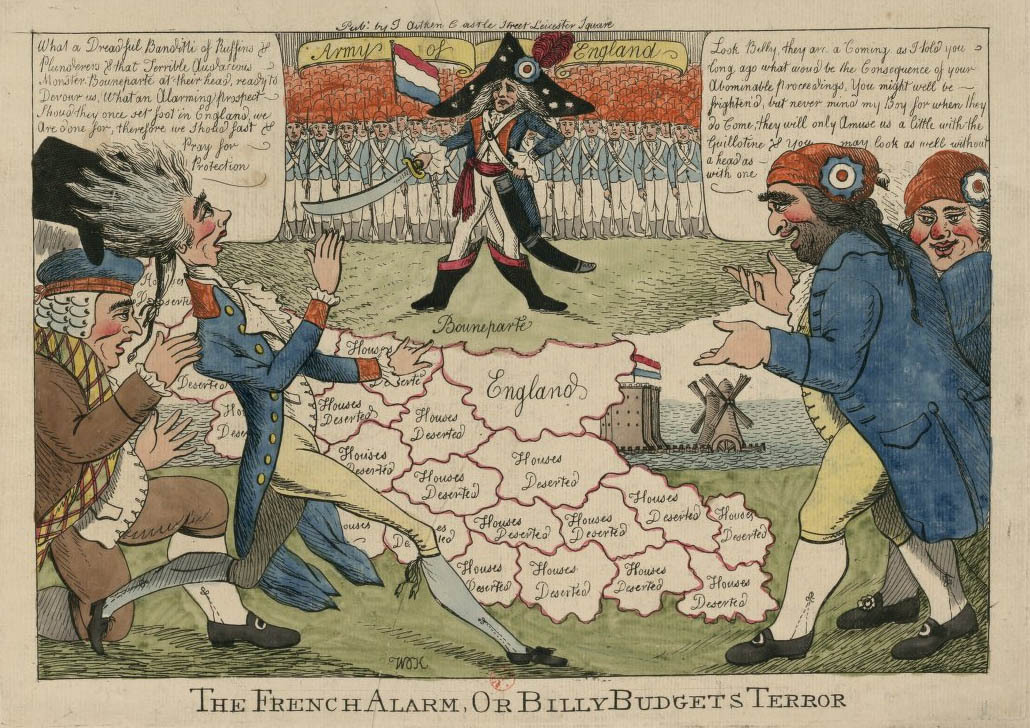20 June 1804 (f. 10)
Sir Home Popham: My dear Lord.
Lord Melville: Sir Home.
Popham: You remember that letter Lord Hutchinson sent you?
Melville: Yes, of course I –
Popham: THERE WAS NO LETTER. THERE WAS NEVER ANY LETTER. AND IF THERE WAS, LORD HUTCHINSON DIDN’T SEND IT.
Melville:
Popham: Oh, and tell Mr Pitt he didn’t receive one, either. Have a great day.

Sir Home Popham, from here
11 July 1804 (f. 18)
Popham: My Lord. May I visit you on Friday?
Melville: Yes, of course. Why not?
Popham: I’ve had my chart of the Red Sea printed for you. I’ll bring it with me.
Melville: Jolly good. I look forward to it.
Popham: Along with a memorandum on a subject to which I understand you and Mr Pitt jointly directed my examination. Which obviously I cannot talk about. Obviously.
Melville: Ouch! Please stop nudging me so hard. I GET IT.
Popham: Sorry.
29 July 1804 (f. 19)
Popham: Sorry I haven’t been in touch for [checks notes] 24 hours. One of my kids was ill.
Melville: That’s quite all right.
Popham: To make up for my silence, here’s an enormously long memorandum about all the bad things the Admiralty under Lord St Vincent has been doing to me.
Melville: I hope you haven’t shown this to anybody else? It’s very … strident.
Popham: Nope. Just you.
Melville: Thank God.
Popham: And Mr Addington.
Melville: … Oh?
Popham: But he told me not to show it to anybody else.
Melville: I’m not surprised. I –
Popham: I may have left a copy with Lord Chatham, Mr Yorke, Lord Hobart, and Sir Andrew Snape Hamond.
Melville: I think you should maybe –
Popham: And most of the other members of the Cabinet. And maybe one or two influential MPs. Oh, and several people I met at the last levee who expressed an interest. But nobody else, I promise.

Henry Dundas, 1st Viscount Melville, from here
Undated, but after the previous one (f. 21)
Popham: I tried to call on you at Putney this morning but I couldn’t find you.
Melville: Ah, erm. I had to leave in a hurry.
Popham: So they told me. I brought you the books I promised.
Melville: Thanks.
Popham: While we’re here, I take this occasion of troubling you with a recital of another act of official duplicity against me.
Melville: *** eats his wig in frustration ***
1 August 1804 (f. 23)
Popham: You know those … things you asked me to examine?
Melville: What things?
Popham: You know. Those … things. Mr … Francis’s … things.
Melville: You’re nudging me again. I told you to stop that. And stop waggling your eyebrows, it’s off-putting.
Popham: Sorry.
Melville: You mean Mr Fulton’s torpedoes?
Popham: OH MY GOD BE QUIET this is supposed to be top secret
10 August 1804 (f. 27)
Popham: At last, I’m ready to start my experiments with Mr … Francis’s … things.
Melville: It’s OK. This is a confidential line. Just say ‘torpedoes’.
Popham: NEW IDEAS HAVE SUGGESTED THEMSELVES TO ME WHICH MAY BE CONSIDERED A GREAT AID TO AN OPERATION SO UTTERLY VITAL TO THE SURVIVAL OF THE COUNTRY
Melville: Right, yes, I figured, or you wouldn’t be writing.
Popham: But I’ll wait until the next post to write about it in detail, because I was only writing to let you know I was still alive and making progress.
Melville: *** groans ***
12 August 1804 (f. 29)
Popham: Coo-ee! It’s me.
Melville: Hi.
Popham: Right well, the … things … well – they, erm. Need work.
Melville: Fine. Take all the time you need.
Popham: But time and season have passed away so fast I have no time for further experiments. I’m going off to Portsmouth tomorrow and will leave some instructions behind about improving the … things.
Melville: All right, but –
Popham: Then I’ll be in town on Wednesday to talk to you.
Melville: Looking forward to it. (to his secretary) Lock the doors and bar the windows, I’m not in, OK?
8 September 1804 (f. 40)
Popham: I came to see you yesterday, but you weren’t in.
Melville: Oh yes, something came up at the last moment. I’m so, so sorry.
Popham: The … things are ready.
Melville: Excellent.
Popham: I spent all of this morning using my telegraphic signals – did I ever tell you about those? They’re brilliant, aren’t they? – to make it look like my primary object in coming ashore was to try the system out on Admiral Lewis’s squadron.
Melville: I suppose you might be expected to be working on them, yes.
Popham: Admiral Lewis signalled back ‘PULL THE OTHER ONE, IT’S GOT BELLS ON’, and I didn’t even know it was possible to signal that.

Robert Fulton (“Mr Francis”), from here
12 September 1804 (f. 44)
Popham: So! We’re meeting on Friday at 11 am?
Melville: If we must.
Popham: I’ll bring Mr … Francis with me.
Melville: Fulton. I know who he is.
Popham: But I can’t say any more here, because there’s no point setting anything down in writing by letter.
MELVILLE: WHY ARE YOU WRITING TO ME THEN?! *** throws chair across room ***
21 September 1804 (f. 53)
Popham: The … things are STILL ready.
Melville: Why haven’t you used them yet, then?
Popham: Too busy writing letters.
Melville: I see.
24 September 1804 (f. 56)
Popham: It’s all ready.
Melville: You said.
25 September 1804 (f. 57)
Popham: Did I mention we were ready?
Melville: YES
27 September 1804 (f. 62)
Popham: Just wanted to tell you it was Thursday.
Later, same day (f. 64)
Popham: … and to assure your Lordship that my attention is most seriously and sincerely directed to this object, and to be ready to act under any circumstances that may arise.
Melville: *** beats head against table ***

Raid at Boulogne, 2-3 October 1804, from here
28 September 1804 (f. 68)
Popham: We’re ready to attack the French tomorrow! So long as the weather holds, your Lordship may depend on it, something will be effected.
Melville: And then you’ll shut up, yes?
Popham: I’d just like it to go down on record that the reason we haven’t done anything yet is because Admiral Lord Keith, who’s nominally in command here, only rocked up yesterday in his flagship. Bastard.
Melville: Noted.
Popham: Just to say if the wind changes, we’re buggered.
Melville: Fine, fine. You’re off the hook. Go away.
[No letters cover the raid on Boulogne on the night of 2/3 October.]
28 October 1804 (f. 71)
Popham: Me again!
Melville: What now.
Popham: I’ve been all over the place. I got your letter at Dover, then went to Ramsgate via Deal, then back to Dover via Sandwich.
Melville: Why?
Popham: No idea. But I just want to tell you that I handed Lord Keith a copy of my instructions.
Melville: OK, that’s – wait. You handed him a copy of your instructions?
Popham: Yep.
Melville: The ones he was supposed to hand to you as your commanding officer?
Popham: Yep.
Melville: *** blinks ***
Popham: He seemed a bit hurt not to get them directly from you.
Melville: I have no idea why.
Popham: Anyway. WANT TO TRY SOME MORE … THINGS AT BOULOGNE?
***
I may have interpreted some of this correspondence rather liberally, but not as much as you’d think, and some of the lines are verbatim. If you don’t believe me, you can call up the volume yourself in the British Library and check.

